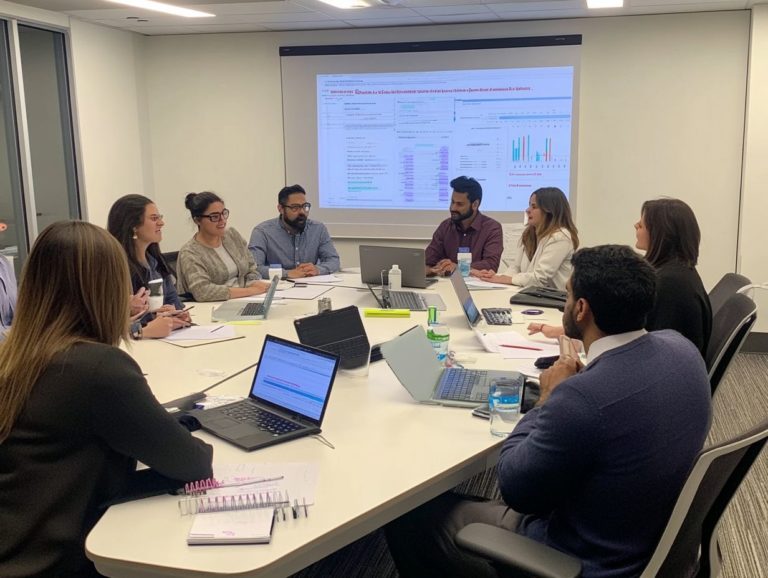“5 Ways to Support CRM Users During Implementation”
Implementing a Customer Relationship Management (CRM) system can be a game-changer for your business, though it’s not without its challenges.
User support plays a crucial role in ensuring a seamless transition. This article delves into five effective strategies for supporting CRM users during implementation, from articulating the purpose and benefits clearly to celebrating significant milestones along the way.
You’ll also explore the common challenges users encounter and how tailored support can greatly enhance the success of your CRM initiative.
Dive in now to discover powerful best practices that will elevate your CRM success!
Contents
- Key Takeaways:
- 1. Clearly Communicate Why CRM Matters!
- 2. Provide Adequate Training and Resources
- 3. Encourage Feedback and Address Concerns
- 4. Offer Ongoing Support and Assistance
- 5. Celebrate Milestones and Successes
- Why Is User Support Important During CRM Implementation?
- How Can User Support Improve the Success of CRM Implementation?
- What Are the Different Types of User Support Available?
- How Can a Business Measure the Effectiveness of User Support During CRM Implementation?
- What Are the Best Practices for Providing User Support During CRM Implementation?
- Frequently Asked Questions
Key Takeaways:

Communicate the CRM’s purpose to gain user support.
Provide training and resources for effective use.
Encourage feedback to meet user needs.
1. Clearly Communicate Why CRM Matters!
Effective communication regarding the purpose and benefits of implementing CRM is essential, especially if you’re part of a small or midsize business.
By focusing on enhancing user engagement and streamlining sales activities, custom solutions can address your specific pain points and goals while utilizing the strength of cloud mobile AI technology.
When you adopt a robust CRM solution, you can anticipate enhanced user engagement and improved sales conversion rates, ultimately leading to increased revenue. These systems enable you to track customer interactions more effectively, ensuring that every team member stays informed and aligned in their approach.
Executive buy-in is crucial; when leadership understands and supports the CRM initiative, it cultivates a culture of customer-centricity throughout your organization.
Recognizing industry-specific CRM options can help you tailor solutions to your unique challenges, amplifying the overall impact on your operations and customer satisfaction.
2. Provide Adequate Training and Resources
Providing adequate training and resources is pivotal to ensuring you fully embrace CRM software. This not only helps you navigate the user interface with confidence but also maximizes the value you derive from the system.
Structured CRM training sessions are key to building that confidence, particularly in today s fast-paced digital landscape. Engaging in interactive workshops allows for hands-on practice, while online tutorials offer the flexibility you need to learn at your own pace, perfect for those juggling remote work.
Personalized coaching sessions can tackle specific challenges you may encounter, ensuring that support is readily available and tailored to your unique needs.
By embracing a variety of training methods, organizations can effectively support a decentralized workforce and cultivate a deeper understanding of the CRM system. This ultimately leads to improved productivity and stronger customer relationships.
3. Encourage Feedback and Address Concerns
Encouraging feedback and addressing concerns from users during CRM implementation is crucial for pinpointing organizational challenges and aligning the system with the genuine pain points and goals of your business.
By employing various methods such as surveys and focus groups, you can gain deeper insights into user experiences, allowing you to tailor your CRM solutions more effectively. Engaging with users through these channels not only cultivates a sense of involvement but also fosters open dialogue about their needs and preferences.
Real-time feedback mechanisms are essential for swiftly addressing any concerns, ultimately enhancing user satisfaction and boosting adoption rates. When you invest in user engagement strategies, you’ll discover that this not only improves the effectiveness of your CRM but also builds stronger relationships and trust between your business and its customers.
Start engaging with your users now to unlock the full potential of your CRM!
4. Offer Ongoing Support and Assistance

Offering ongoing support and assistance is essential for the success of your CRM integration. It ensures you have the resources at your fingertips to navigate automated processes and effectively monitor performance.
This support typically takes shape through various channels. Picture help desks staffed with specialized personnel ready to promptly address your inquiries. You may also find online support communities where you can share experiences and solutions in a collaborative atmosphere. Regular check-ins can elevate your user experience, allowing teams to provide personalized guidance and reinforce best practices.
Utilizing performance monitoring tools is vital. These tools enable you to track your engagement and utilization of the CRM system. This helps you gain a deeper understanding of its features and maximize your return on investment.
5. Celebrate Milestones and Successes
Celebrating milestones and successes during your CRM deployment reinforces user engagement and motivates your teams by showcasing measurable improvements in sales efficiency and overall performance.
To pinpoint these key milestones, regularly track specific performance measures, such as user adoption rates, lead conversion ratios, and customer satisfaction scores.
Once you acknowledge these achievements, boost team motivation with various celebration methods. For instance, implementing recognition programs that highlight outstanding individuals or teams fosters a culture of appreciation.
Sharing success stories that spotlight the expertise of CRM vendors illustrates how the system has positively impacted business operations. This not only showcases successes but also inspires others to leverage the platform more effectively.
Start celebrating your milestones today!
Why Is User Support Important During CRM Implementation?
User support plays a pivotal role during CRM implementation, directly impacting your adoption rates and the successful execution of both operational and analytical CRM strategies. It equips you to navigate the system with confidence.
This support is crucial at every stage, starting with initial training that familiarizes you with essential features and functionalities. Ongoing assistance addresses your questions and challenges as they arise.
By fostering a culture of open communication, organizations can cultivate robust feedback mechanisms. This engagement boosts your confidence and facilitates seamless data migration, crucial for maintaining the accuracy and integrity of customer information.
When you feel supported, your engagement levels rise, leading to improved utilization of CRM capabilities and a more successful implementation overall.
What Are the Common Challenges Faced by CRM Users During Implementation?
Common challenges you may encounter during CRM implementation often arise from organizational hurdles that impede user adoption:
- Inadequate training
- Resistance to change
- Complexities of deploying the CRM
These obstacles may manifest in several forms, such as confusion surrounding new software features or reluctance among your team to transition from familiar methods. Without proper training sessions, you might feel overwhelmed, leading to frustration and disengagement.
To address these issues effectively, invest in comprehensive training programs tailored to the different roles within your organization. Create an environment where feedback is not just welcomed but actively encouraged.
Tackling these challenges from the outset boosts your team’s confidence in navigating the CRM and enhances overall satisfaction as employees begin to appreciate the system’s value in their daily tasks.
How Can User Support Improve the Success of CRM Implementation?

User support plays a pivotal role in the success of Customer Relationship Management (CRM) implementation. It enables a smoother integration process and instills confidence in your ability to leverage the system for enhanced sales efficiency.
When you receive personalized coaching, you gain a deeper understanding of the intricate features the CRM offers, enabling you to harness its full potential.
For example, having access to real-time assistance during onboarding allows you to tackle specific questions on the spot. This creates a more seamless adaptation experience.
As you become adept at navigating the system, your engagement will naturally increase. This can lead to higher sales metrics and stronger customer relationships.
This tailored support fosters your trust and creates an environment where you feel valued. Ultimately, it drives the overall success of the CRM initiative.
What Are the Different Types of User Support Available?
You have a wealth of user support options during CRM implementation. These include training support, online resources, forums, and personalized assistance.
These support channels help ensure a smooth transition and boost your satisfaction. Training support often comes in the form of hands-on workshops or virtual sessions, allowing you to familiarize yourself with the system’s features in real-time.
Online resources, such as video tutorials and FAQs, enable you to access information at your own pace, promoting self-sufficiency. Community forums serve as a vibrant platform where you can share experiences, ask questions, and collaboratively find solutions.
Personalized assistance from dedicated support teams or on-site consultants ensures that any specific challenges you encounter are addressed swiftly. This fosters your ongoing engagement with the CRM system.
How Can a Business Measure the Effectiveness of User Support During CRM Implementation?
Measuring the effectiveness of user support during your CRM implementation involves diving into user engagement metrics and gathering feedback. You can also use performance monitoring tools to see how well you re adapting to the new system.
This analysis can involve several methods, such as:
- Conducting targeted surveys to capture your sentiments and challenges.
- Utilizing performance metrics to spot trends in usage.
- Tracking user adoption rates to assess how many individuals are actively engaging with the new platform.
These tools provide invaluable insights that help your support teams customize their resources and strategies. By continuously improving based on these measurements, you ensure that user support evolves alongside your needs.
This ultimately fosters a more productive and satisfied workforce as you navigate the complexities of CRM systems.
What Are the Best Practices for Providing User Support During CRM Implementation?
Using best practices for user support is key to boosting user adoption and ensuring a smooth CRM transition. One effective strategy is to offer personalized training sessions tailored to the unique needs of different teams within your organization.
This approach enables users to grasp the system’s functionalities more intuitively. Incorporating timely feedback mechanisms allows users to voice their challenges and suggest improvements in real time.
Providing ongoing assistance through dedicated support teams ensures that help is readily accessible whenever users encounter roadblocks.
Embrace these strategies now to enhance user confidence and engagement, both of which are crucial for a successful CRM rollout.
Frequently Asked Questions

What is the purpose of supporting CRM users during implementation?
Supporting CRM users during implementation ensures they adopt the new system successfully. This help maximizes the benefits and boosts user satisfaction.
What are the potential challenges that CRM users may face?
Users often struggle with learning a new system and adjusting to changed daily tasks.
They may also face technical problems and feel hesitant to embrace change.
How can training support CRM users?
Training is vital for CRM users.
Comprehensive sessions teach them how to use the system effectively and highlight its benefits, boosting their confidence.
What role does communication play?
Communication is key during implementation.
Keeping users informed fosters a positive attitude toward the new system and addresses their concerns right away.
Why is user feedback important?
User feedback shows that their opinions matter.
Listening and acting on feedback enhances the system and increases user satisfaction.
How does ongoing support benefit users?
Ongoing support supercharges CRM users by helping them improve their skills continuously.
This leads to higher productivity and overall satisfaction.






